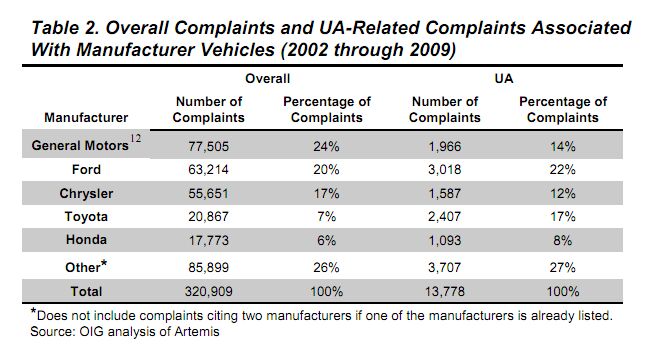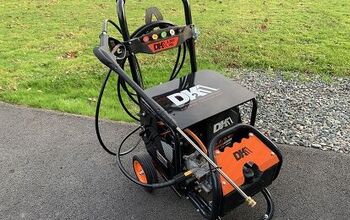Inspector General: NHTSA Needs To Rethink Defect Investigation
Remember the uproar over Unintended Acceleration in Toyotas? After more than a year of investigation, NHTSA has yet to find a definitive cause for the furor… although the experience was not an entire waste. In fact, the most interesting result of the entire situation was that it cast light on NHTSA’s inefficacy as much as it did embarrass Toyota’s quality control. And to help clarify what exactly the lessons of the Toyota flap were, the DOT’s Inspector General has released a report detailing its criticisms of the federal safety regulators. According to the report [ PDF], NHTSA’s Office of Defect Investigation (ODI) has not
- Adequately tracked or documented pre-investigation activities.
- Established a systematic process for determining when to involve third-party or Vehicle Research and Test Center (VRTC) assistance
- Followed timeliness goals for completing investigations or fully implemented its redaction policy to ensure consumers’ privacy. [Ed: gee, you think?]
- Established a complete and transparent record system with documented support for decisions that significantly affect its investigations.
- Developed a formal training program to ensure staff has the necessary skills and expertise.
In his response, NHTSA Administrator David Strickland largely concurred with the audit’s findings, and is working with the ODI to improve investigation processes, transparency, privacy controls, staffing, training and more. In short, the government has reached the same conclusion that I reached on the day of the angst-filled Toyota testimony before congress, to wit:
Congress holds hearings like these to uncover shocking evidence and to impress its constituents with its dedication to their safety and well-being. Having been enticed into believing that sinister conspiracies exist in Toyota’s software code and the halls of the NHTSA, the House Energy Committee uncovered only one actionable solution to the ongoing scandal: [improving] NHTSA’s investigative capabilities. Put differently, after hours of posturing congress finally met the enemy and he was them.
More by Edward Niedermeyer
Latest Car Reviews
Read moreLatest Product Reviews
Read moreRecent Comments
- Fred I would get the Acura RDX, to replace my Honda HR-V. Both it and the CRV seats are uncomfortable on longer trips.
- RHD Now that the negative Nellies have chimed in...A reasonably priced electric car would be a huge hit. There has to be an easy way to plug it in at home, in addition to the obvious relatively trickle charge via an extension cord. Price it under 30K, preferably under 25K, with a 200 mile range and you have a hit on your hands. This would be perfect for a teenager going to high school or a medium-range commuter. Imagine something like a Kia Soul, Ford Ranger, Honda CR-V, Chevy Malibu or even a Civic that costs a small fraction to fuel up compared to gasoline. Imagine not having to pay your wife's Chevron card bill every month (then try to get her off of Starbuck's and mani-pedi habits). One car is not the solution to every case imaginable. But would it be a market success? Abso-friggin-lutely. And TTAC missed today's announcement of the new Mini Aceman, which, unfortunately, will be sold only in China. It's an EV, so it's relevant to this particular article/question.
- Ajla It would. Although if future EVs prove relatively indifferent to prior owner habits that makes me more likely to go used.
- 28-Cars-Later One of the biggest reasons not to purchase an EV that I hear is...that they just all around suck for almost every use case imaginable.
- Theflyersfan A cheaper EV is likely to have a smaller battery (think Mazda MX-30 and Mitsubishi iMEV), so that makes it less useful for some buyers. Personally, my charging can only take place at work or at a four-charger station at the end of my street in a public lot, so that's a crapshoot. If a cheaper EV was able to capture what it seems like a lot of buyers want - sub-40K, 300+ mile range, up to 80% charging in 20-30 minutes (tops) - then they can possibly be added to some lists. But then the issues of depreciation and resale value come into play if someone wants to keep the car for a while. But since this question is asking person by person, if I had room for a second car to be garaged (off of the street), I would consider an EV for a second car and keep my current one as a weekend toy. But I can't do a 50K+ EV as a primary car with my uncertain charging infrastructure by me, road trips, and as a second car, the higher insurance rates and county taxes. Not yet at least. A plug in hybrid however is perfect.


































Comments
Join the conversation
I'm a Prius owner and I've also owned 2 Fords. I've personally experienced stuck gas pedals in both Fords, and I've experienced flawless performance from the Prius. Let me say that again: Ford: 2 Toyota: 0 Lower is better. No, data is not the plural of anecdote, but it does make me skeptical of the hype. Also, since I've had stuck gas pedals in 2 of the last 5 cars I've owned (or driven regularly as part of the family), I'd submit that learning how to deal with a stuck gas pedal is a skill that every driver should have. For the record, my Tempo had a binding throttle cable at somewhere around 140k miles. The stuck pedal in my Ranger was probably because it got tangled up in a floor mat. Both were manual transmission cars, so I just put in the clutch and dealt with the (rather noisy) problem while I was coasting. We've put about the same number of miles on the Prius as I have on those two Fords combined, and I'm not reluctant to shift the Prius into neutral, hit the "Park" switch, or turn the car "off" if I have to -- given my experience with the Fords, and the hype, I've done a few practice drills in the Prius and feel confident that I could deal with it competently.
To properly put UA in perspective, one needs to dig deeper, and use the approach favored by engineers when creating an FMEA, namely speaking in terms of severity, where severity is not a function of occurrence, or the ability to detect the existence of the fault during the manufacturing process. By taking each occurrence for each vehicle line, or cross-vehicle common sub-/system, and multiplying it by say, 10 for deaths, 8 for injuries, 6 for vehicular or property damage, 4 for a pants-filling near-miss, 2 for a lesser incident, these issues could be put into better context, better understood and acted on with a deliberate, rather than possibly extingent, priority.